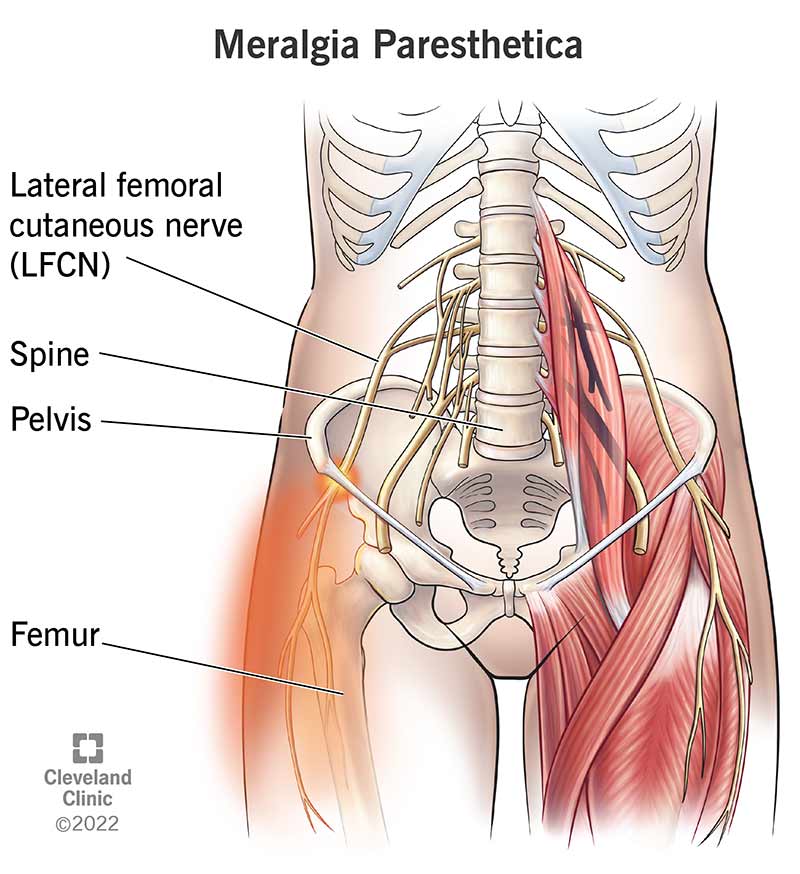Meralgia paresthetica causes pain and sensations of burning or numbness in your thigh area due to compression of a nerve. Several conditions and situations can cause it, such as wearing tight clothing, pregnancy and direct injury to your nerve. Meralgia paresthetica is treatable.
Advertisement
Cleveland Clinic is a non-profit academic medical center. Advertising on our site helps support our mission. We do not endorse non-Cleveland Clinic products or services. Policy

Image content: This image is available to view online.
View image online (https://my.clevelandclinic.org/-/scassets/images/org/health/articles/17959-meralgia-paresthetica)
Meralgia paresthetica is a medical condition that causes pain and sensations of aching, burning, numbness or stabbing in your thigh area. The condition results from compression (pressure on or squeezing) of your lateral femoral cutaneous nerve (LFCN). This large nerve supplies sensation to the front and side of your thigh.
Advertisement
Cleveland Clinic is a non-profit academic medical center. Advertising on our site helps support our mission. We do not endorse non-Cleveland Clinic products or services. Policy
“Meralgia” means “pain in the thigh,” and “paresthetica” means “burning pain, tingling or itch.”
While the condition can be bothersome, it’s not life-threatening or dangerous to your health.
Anyone can develop meralgia paresthetica, but you’re more likely to develop this condition if you:
Meralgia paresthetica is relatively common, but it’s frequently misdiagnosed. Researchers estimate that it affects 3 to 4 people out of every 10,000 per year.
Symptoms of meralgia paresthetica only occur on one side of your body in the front of your upper thigh. They include:
Meralgia paresthetica doesn’t directly cause issues with your muscles or movement.
Advertisement
Meralgia paresthetica results from the compression of your lateral femoral cutaneous nerve (LFCN). Your LFCN is a large sensory nerve. It travels from your spinal cord through your pelvic region and down the outside of your thigh. This compression can happen due to swelling and inflammation, injury or pressure.
A variety of factors causes compression of your LFCN, including external and internal causes. These can include:
Healthcare providers can typically diagnose meralgia paresthetica with a physical exam and a thorough understanding of your symptoms, medical history and lifestyle.
Your provider will review your medical and surgical history. As several situations and conditions can cause meralgia paresthetica, they’ll ask many questions to try to determine the possible cause of your symptoms.
They’ll perform a thorough physical exam, including a hands-on test called a pelvic compression test. During this test, your provider will apply pressure on your thigh to rule out other causes of your symptoms. They may perform other light touch and reflex tests.
If they can’t determine the cause of meralgia paresthetica, they’ll likely order certain medical tests.
If your healthcare provider can’t determine the cause of meralgia paresthetica based on your medical and lifestyle history, they may order blood tests to check the following:
They may order an X-ray of your pelvis and thigh to rule out other medical conditions, like bone tumors. Other imaging tests, such as a CT scan or magnetic resonance imaging (MRI) scan can check for other spinal or nerve issues, like a herniated disc.
Treating meralgia paresthetica involves treating the underlying cause.
The majority of cases improve with conservative treatment, such as losing weight, wearing loose clothing or avoiding certain restrictive items like belts.
Many people with meralgia paresthetica benefit from other interventions, including:
Advertisement
Physical therapy may help, but there’s limited research on its effectiveness in treating meralgia paresthetica.
Rarely, surgery is necessary to correct compression on the lateral femoral cutaneous nerve. Healthcare providers usually only recommend surgery for people who try other treatments but still experience symptoms.
Most cases of meralgia paresthetica improve with conservative treatment or may even resolve on their own.
The prognosis (outlook) for meralgia paresthetica is usually good. Approximately 85% of people with meralgia paresthetica experience recovery with conservative treatment.
Cases due to surgical intervention or direct nerve injury typically improve within three months. Pregnancy-associated cases typically improve after the delivery of your baby.
Left untreated, meralgia paresthetica may cause increased pain, numbness or other sensations like burning. These effects may interfere with the ability to walk or move as you normally do.
There’s no way to prevent meralgia paresthetica. You can reduce your likelihood of developing it by:
If you’ve been diagnosed with meralgia paresthetica and your treatment isn’t working or you’re experiencing negative side effects, talk to a healthcare provider about other options.
Advertisement
Meralgia paresthetica is a medical condition that causes pain and sensations of aching, burning, numbness or stabbing in your thigh area. While meralgia paresthetica isn’t a danger to your health, it can cause unpleasant and uncomfortable symptoms. If the condition is interfering with your quality of life, talk to a healthcare provider. They can determine the underlying cause and recommend treatments.
Advertisement
Learn more about the Health Library and our editorial process.
Cleveland Clinic's health articles are based on evidence-backed information and review by medical professionals to ensure accuracy, reliability, and up-to-date clinical standards.
Cleveland Clinic's health articles are based on evidence-backed information and review by medical professionals to ensure accuracy, reliability, and up-to-date clinical standards.
Need care fast? Cleveland Clinic’s Express Care and Urgent Care locations treat everything from sprains to sinus infections — no appointment needed.
